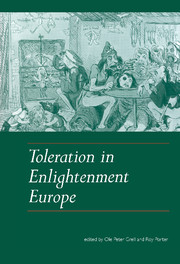Book contents
- Frontmatter
- Contents
- List of contributors
- Preface
- 1 Toleration in Enlightenment Europe
- 2 Toleration and the Enlightenment Movement
- 3 Multiculturalism and Ethnic Cleansing in the Enlightenment
- 4 Intolerance, the Virtue of Princes and Radicals
- 5 Spinoza, Locke and the Enlightenment Battle for Toleration
- 6 Toleration and Enlightenment in the Dutch Republic
- 7 Toleration and Citizenship in Enlightenment England: John Toland and the Naturalization of the Jews, 1714–1753
- 8 Citizenship and Religious Toleration in France
- 9 A Tolerant Society? Religious Toleration in the Holy Roman Empire, 1648–1806
- 10 Enlightenment in the Habsburg Monarchy: History of a Belated and Short-Lived Phenomenon
- 11 Toleration in Eastern Europe: the Dissident Question in Eighteenth-Century Poland–Lithuania
- 12 Toleration in Enlightenment Italy
- 13 Inquisition, Tolerance and Liberty in Eighteenth-Century Spain
- Index
1 - Toleration in Enlightenment Europe
Published online by Cambridge University Press: 03 February 2010
- Frontmatter
- Contents
- List of contributors
- Preface
- 1 Toleration in Enlightenment Europe
- 2 Toleration and the Enlightenment Movement
- 3 Multiculturalism and Ethnic Cleansing in the Enlightenment
- 4 Intolerance, the Virtue of Princes and Radicals
- 5 Spinoza, Locke and the Enlightenment Battle for Toleration
- 6 Toleration and Enlightenment in the Dutch Republic
- 7 Toleration and Citizenship in Enlightenment England: John Toland and the Naturalization of the Jews, 1714–1753
- 8 Citizenship and Religious Toleration in France
- 9 A Tolerant Society? Religious Toleration in the Holy Roman Empire, 1648–1806
- 10 Enlightenment in the Habsburg Monarchy: History of a Belated and Short-Lived Phenomenon
- 11 Toleration in Eastern Europe: the Dissident Question in Eighteenth-Century Poland–Lithuania
- 12 Toleration in Enlightenment Italy
- 13 Inquisition, Tolerance and Liberty in Eighteenth-Century Spain
- Index
Summary
Prehistory
The invention of printing, the Protestant Reformation and the reactions of princes and popes brought furious struggles, theological and political, over conscience and coercion, faith and freedom. Throughout the Reformation and Counter-Reformation eras, Europe remained uncompromisingly a ‘persecuting society’, even if arguments for toleration, both on principle and as a politique necessity, were also advanced.
The publicists of the Enlightenment further developed such pleas for toleration, and in the process their basis and character was transformed, with the original religious rationales becoming incorporated within a wider philosophy of freedom conceived as a fundamental human attribute and precondition for civilized society. Liberté would head the Rights of Man of 1789, just as religious freedom – guaranteed by the absence of an established church – was one of the shibboleths of the Constitution of the United States, whose third president, Thomas Jefferson, boldly proclaimed the ‘illimitable freedom of the human mind’. Toleration was thus to acquire a secular cast as, in liberal ideologies, freedom of thought and speech became definitive of human rights, alongside other cherished freedoms like habeas corpus.
In reality, however, the eighteenth century saw toleration nowhere unequivocally and comprehensively embraced in either theory or practice; and where it gained ground, it was partial, fragile, contested and even subject to reversal. No clear and distinct metaphysics underpinned toleration claims, nor was there a single, classic, foundational text, commanding universal assent. It will be the aim of this book, therefore, to address the ambiguities, limits and fluctuations no less than the extension of toleration in the Enlightenment.
One point, moreover, must first be stressed.
- Type
- Chapter
- Information
- Toleration in Enlightenment Europe , pp. 1 - 22Publisher: Cambridge University PressPrint publication year: 1999
- 2
- Cited by

